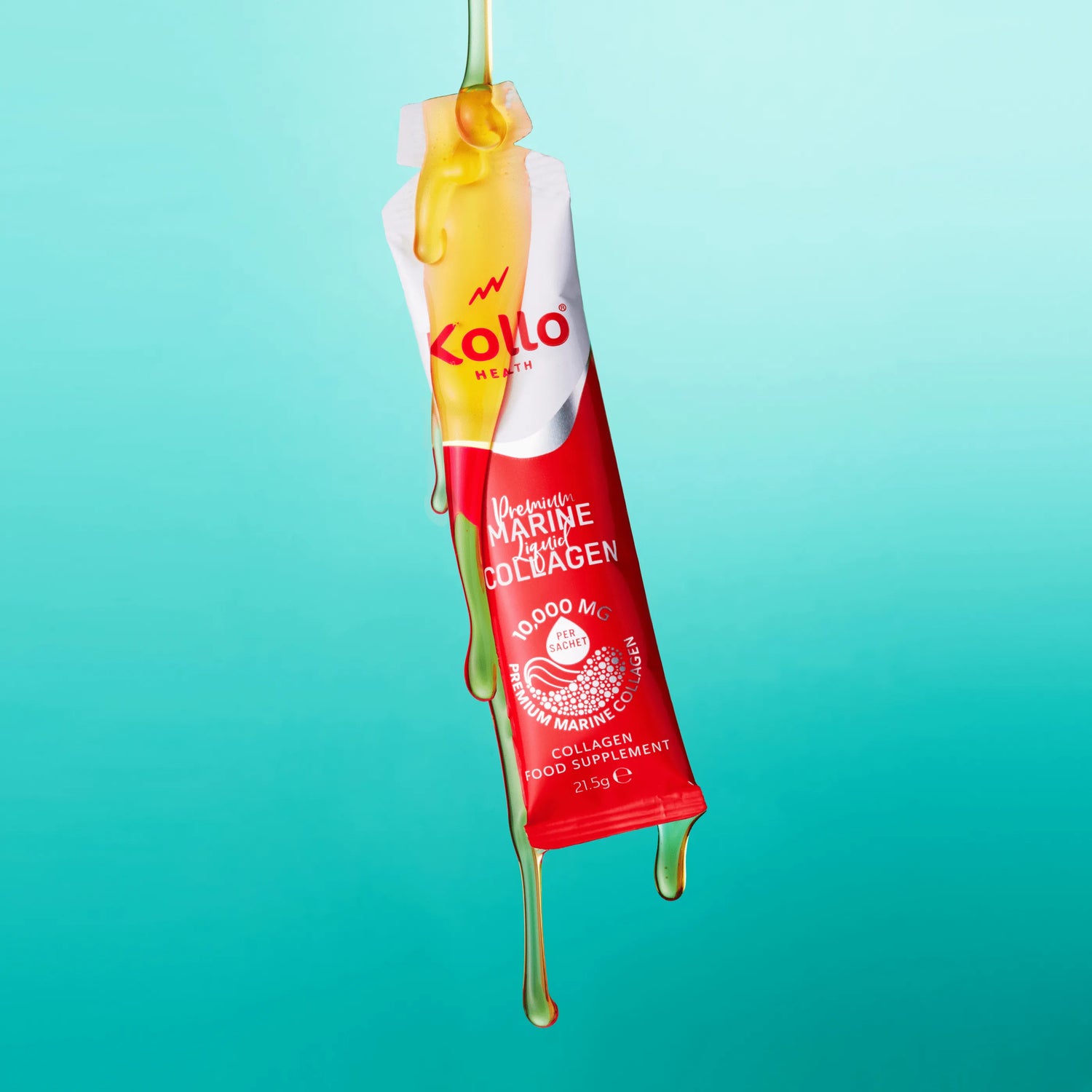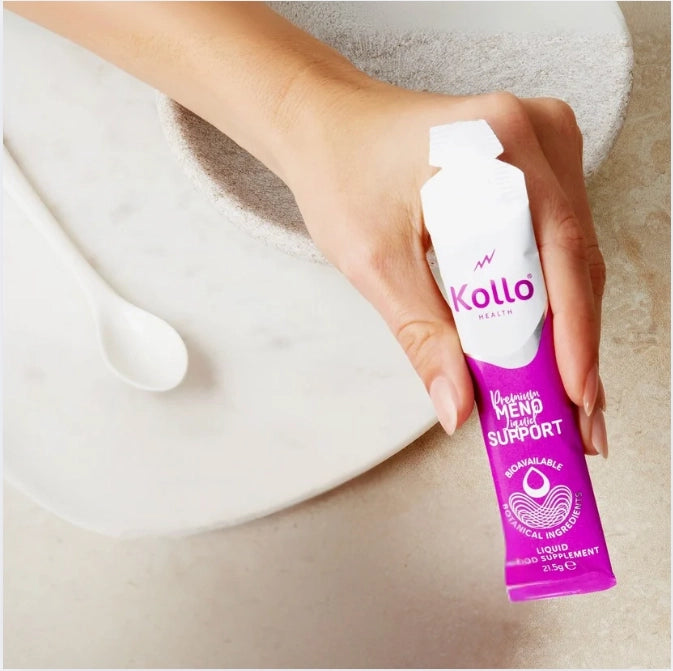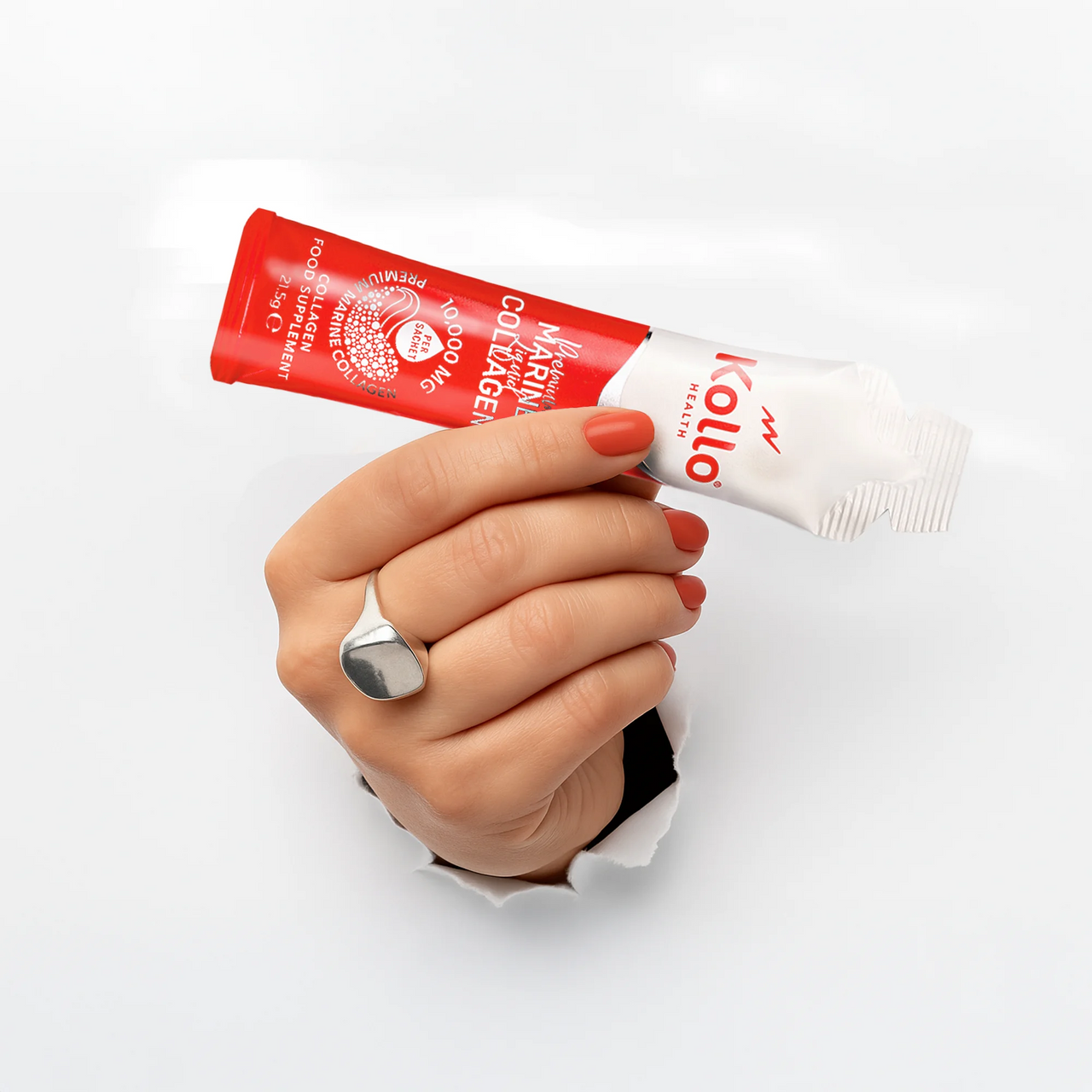Most commonly known for improving the appearance of our skin and hair, collagen offers a number of additional benefits for both our health and appearance. Collagen is actually the most abundant protein in the body and is also responsible for the health of joints, bones, nails and more.
Collagen is essential for maintaining our health and wellbeing, yet as we age collagen production decreases. From the age of around 20 to 25, collagen production will decrease by around 1% per year, having detrimental effects on the body visually and internally.
At Kollo Health, we have created a collagen 10,000mg sachet containing the highest amount of collagen available on the market, along with a number of other beneficial compounds to help get you looking and feeling your best.
How Kollo Health Sources Our Collagen
The 10,000mg of collagen in our sachets is made from scientifically backed marine collagen. Marine collagen is an alternative to bovine, poultry and other forms of animal collagen commonly available.
Bovine collagen is made from the bones and hides of cows and contains collagen type 1 and collagen type 3, whereas marine collagen is made from fish scales and bones and contains only collagen type 1. Collagen type 1 is a closer fit to a majority of the collagen in the human body which means it is easier for the body to break down and use.
Marine collagen is made from fish, which also makes it more inclusive. It can be taken by pescatarians and those who don't consume cows for religious reasons. Marine collagen is also more sustainable. Often, cows are bred exclusively for bovine collagen.
At Kollo Health, our marine collagen is sustainably sourced from byproducts of the fishing industry, reducing waste and minimising environmental impact. This is beneficial to the environment as raising a cow is an extremely energy, water and space-intensive process.
Why Should I Take a Collagen Supplement?
There are various goals people have in mind when they start using a collagen supplement, ranging from cosmetics to overall health and wellness. Collagen is a protein that exists throughout the body in your skin, joints, bones, muscles and gut. There are actually at least 28 types of collagen known to exist in vertebrates, but the most abundant are Types I and III.
Human beings produce collagen naturally via the fibroblasts in our cells. But our ability to naturally synthesise collagen diminishes over time, starting in the 20s and culminating in a complete inability to create new collagen in our 40s or 50s. The consequences of this are the symptoms of ageing, like sagging skin or aching joints, so many people look for ways to naturally support collagen production.
This is where collagen supplements come in. They consist of collagen extracted from animals like fish, cows, pigs or chickens. That collagen is put through a process called hydrolysis to break it down into smaller amino acid chains known as collagen peptides. These are more easily assimilated into the body so that the amino acids can stimulate our own natural collagen production.
What Can Collagen 10,000mg Sachet Do for My Skin?
According to research, collagen peptides can support greater skin elasticity and collagen density in the dermis. Collagen protein forms connective tissues that hold the skin in place, and these can break down with age, causing the skin to sag, wrinkle and generally appear less firm.
Collagen is also beneficial for skin renewal as it boosts the cell turnover rate, contributing to the fast healing of blemishes and scars as the skin cells are being replaced more frequently. Studies have indicated that an intake of between 2.5 and 10g collagen per day offers benefits for skin support.
Collagen also helps skin cells retain moisture, making the skin appear fuller, more hydrated and youthful. Collagen is also a really effective antioxidant. Antioxidants can help to neutralise free radicals in the body.
Free radicals are harmful, unstable molecules that build up in the body from exposure to everyday things like pollution, UV rays, and refined sugars. These free radicals are missing an electron and will break down beneficial cells in the body to acquire this.
These beneficial cells, which are damaged, can often be collagen-producing cells which can further decrease the production of collagen in the body. Antioxidants like collagen can safely give up an electron to neutralise free radicals and stop them from damaging cells in the body.
Collagen 10,000mg and Its Effects on the Hair
Collagen offers multiple benefits for hair, from boosting growth to reducing greying and enhancing strength. Let's explore these benefits in more detail.
Hair Growth
There are many triggers for hair loss and thinning, but one of these issues can be a lack of collagen. This is because hair is made of keratin, and collagen can be broken down into amino acids that can be built up to produce keratin and, therefore, faster growing hair.
As well as this, collagen is also responsible for the health of the dermis on the scalp. The dermis is the layer of skin found underneath the outer layer of skin (epidermis.) The dermis is where the hair follicles are found, so a stronger and hydrated dermis means stronger hair follicles, and this means that hair is less likely to fall out.
Greying hair
Grey hair is caused by damage to the pigment cells within the hair follicles. These pigment cells are damaged not only with age but also exacerbated by exposure to free radicals. Collagen, being an antioxidant, can prevent free radicals from harming these pigment cells and, therefore, reduce greying of the hair.
Stronger hair
Similar to how collagen can promote hair growth (collagen is broken down into amino acids, which can synthesise keratin), it can also lead to stronger hair. This can also make the quality of hair stronger, resulting in reduced breakages and split ends. Regular collagen intake can leave your hair feeling strong and silky.
Collagen 10,000mg and Nails
Like the hair, nails are also made of keratin, so collagen can improve the growth rate and strength of the hair in the same way that the nails can. This will leave your nails less likely to break.
Collagen 10,000mg and Gut Health
Research has discovered that people with digestive challenges often have lower levels of certain collagen types. This led to the discovery that the amino acid L-glutamine, which is in collagen, supports digestive health by fuelling the intestinal cells. The gut lining also uses glycine and proline for energy - two other amino acids that are found in collagen.
Collagen 10,000mg and Muscle development
Though collagen is missing one or two amino acids that would make it a complete protein, it still contains nearly 20 essential amino acids to support muscle mass. There was a study that found men participating in an exercise program taking collagen gained more muscle than those who only did the exercise program. If you want to increase muscle mass and promote faster recovery, you may need a higher dosage of 15-20 grams of collagen daily.
Collagen 10,000mg and Bone Health
Primarily, bones are made of collagen. In fact, around 90 to 95% of the bone matrix is comprised of collagen fibres, so it makes sense that as collagen production decreases, bones get weaker and become more susceptible to fracture. Regularly taking collagen 10,000 mg can also ward off osteoporosis and other bone density-related issues. The science suggests that a minimum of 5g per day provides the support needed to boost bone density over time.
Can Collagen Help With Joint Pain?
Type II collagen is part of the makeup of our joints, and people who take a Type II collagen supplement may see improvements in their joint mobility and comfort. It’s a fundamental protein in cartilage production and maintenance. Cartilage is softer than bone and is a more spongey substance that can be found within and around the joints.
Cartilage protects the joints from impact and rubbing and allows for a healthy range of motion in the body. The stiffness associated with ageing comes from the cartilage wearing down and the body not producing enough collagen to replace it. This causes a reduction in the effectiveness of the cartilage shock absorbers around the joints. Kollo Health's collagen 10,000 mg can help with cartilage and joint health and soothe joint stiffness.
Pro tip: Research has shown that 2.5-g per day can yield the joint support benefits of marine collagen.
What Else Is in Kollo Health's Collagen Sachets?
Our sachets themselves are 21.5g with 10,000mg marine collagen and the rest of it being other beneficial compounds which work with collagen to get you looking and feeling your best.
Vitamin C in Kollo Health’s Collagen
Each sachet of our collagen 10,000 mg sachet contains 100% of your recommended daily vitamin C. Vitamin C is not only an antioxidant like collagen (so it can neutralise free radicals and prevent cell damage), but it is also able to facilitate the production of collagen. Vitamin C also helps with the absorption of iron and greatly improves the immune system.
Vitamin C is easily water-soluble and not stored in the body, though this means there is no chance of an overdose. It also means that vitamin C needs to be consistently consumed to be effective, so it is good to know that you're getting all your required vitamin C in a daily supplement.
B Vitamins in Kollo Health’s Collagen
We have also introduced a number of B vitamins into the mix, as it can be difficult to get the right amount of these daily. In our collagen 10,000 mg sachet, we have packed in 60% of the daily recommended B1, B5, B6, and B12. B1 is a great vitamin to take to combat fatigue, as it helps the cells convert food into energy. A lack of B1 can cause loss of appetite, tiredness, and muscle weakness.
B5 is also an essential mineral to combat fatigue, as it assists in the breaking down of carbohydrates and fats. It is also able to help the body to manufacture red blood cells. The B5 vitamin helps skin cells retain water which can be of great benefit to the appearance of the skin.
B6 helps to develop the brain, nerves and skin. A deficiency of B6 can lead to an inflammation of the skin, numb feelings on the hands and feet, as well as confusion, irritability and depression.
Lastly, B12 is extremely important to body function. It assists the body in creating DNA and is nourishing to the nervous system and brain. Not getting enough B12 can lead to extreme tiredness, mount ulcers, pins and needles, and muscle weakness.
Digging Deeper Into Collagen and Protein Dosages
Bear in mind that collagen is a very specific type of protein. Health organisations are yet to settle on an official daily recommendation at the time of writing. Still, it’s generally recommended that healthy adults consume at least 1 gram of protein per kilogram of body weight each day to maintain their muscle mass.
our protein needs increase with higher levels of physical activity. Whether you’re active or have specific health conditions, ensuring adequate protein intake, including collagen, is key to maintaining muscle mass and overall health. If you are a very physically active adult, you should aim to take in 1-1.5 kilograms of protein per kilogram of body weight every single day.
For people with certain health conditions, the daily protein requirements may be even higher. This is because of the greater protein turnover caused by the body’s need for more healing. People are advised to consult their doctor about protein requirements in these cases.
That said, it's important to remember that collagen is not a complete protein. This means it should be paired with other protein sources to ensure you are getting the required intake of all the essential amino acids.
Vegetarians and vegans often find they have to focus on incorporating more complementary proteins into their diet to ensure they are getting everything they need. This principle should also be applied to collagen - combine it with other protein sources to ensure you are not missing anything essential in your daily routine.
When Is the Best Time of Day To Take Collagen?
It’s important to take your supplements at the right time of day. There is conflicting information about this with regard to collagen, so we will examine the options.
Morning
Some claim this is the best time as your stomach will be empty. Expert advice suggests this does not matter because most of the proteins are absorbed in the small intestine. The peptides are already highly bioavailable, so your body will easily absorb them.
Midday
Another common suggestion is to consume collagen as a snack when you take a midday break. This may have some value if you combine the collagen with something like a smoothie or peanut butter, but the collagen itself is unlikely to fill you up.
Evening
Many advocates of taking the supplement in the evening argue that your body might absorb it better in sleep. But this is just a theory based on very little evidence, and the general consensus among experts is that collagen absorption works equally well in the morning or the evening.
The bottom line: it makes no difference.
The best practice is to take your collagen supplement at a time that works for you. But aim to be consistent — if you take it in the morning, do that every day, or if you blend it into your lunchtime smoothie, keep doing so. Make it as easy as possible to incorporate into your routine.
Learn More
At Kollo Health, we offer a 21.5g drinkable sachet with an impressive 10,000 mg of high-quality, scientifically backed marine collagen. We have worked to combine an effective mix of vitamins with collagen into a drink form while making the supplement delicious and easy to drink daily so you can see the best effects. From this, we have gained a great number of positive reviews and a loyal customer base.
At Kollo Health, we’re dedicated to providing not just a premium collagen product but also outstanding customer support. If you have any questions or need guidance, our expert team is here to help. Explore our collagen box options today and discover the benefits of Kollo’s scientifically backed marine collagen for yourself.







